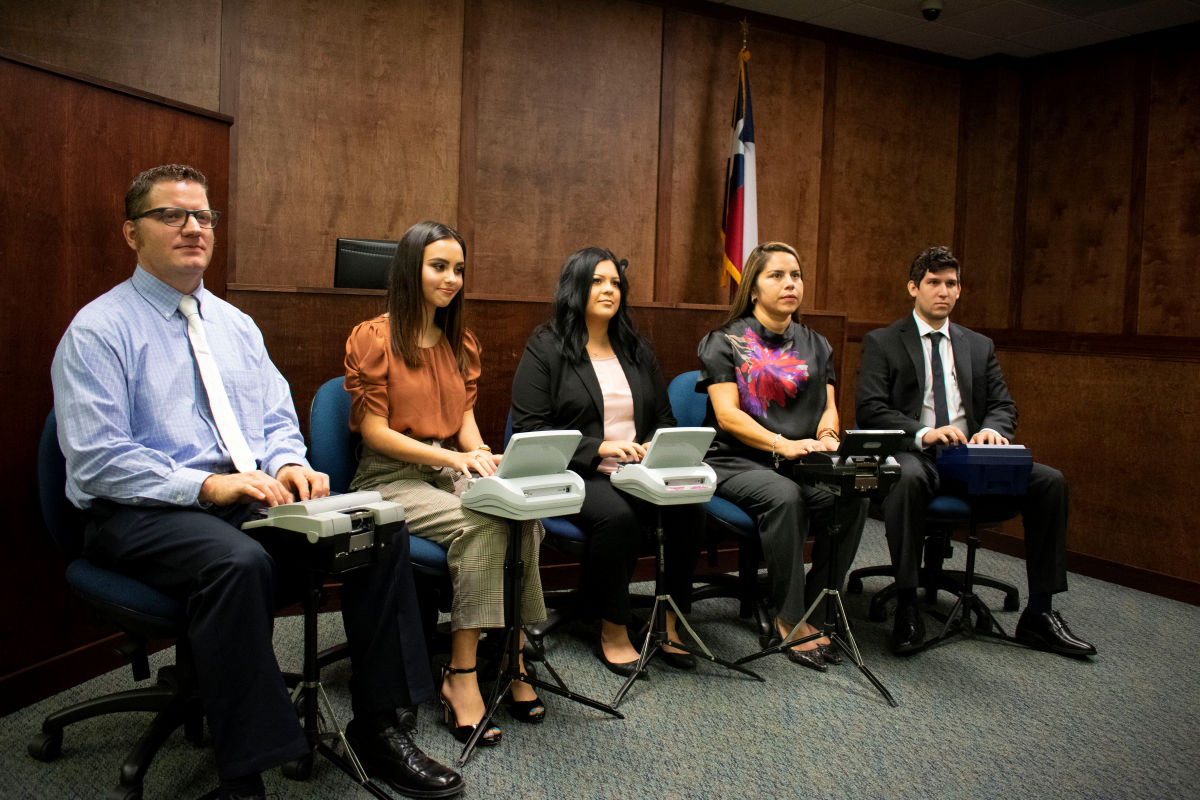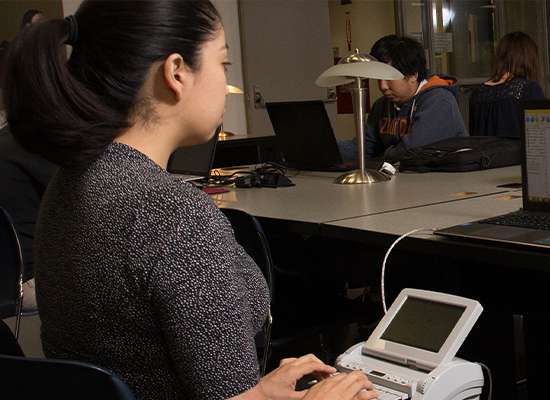Everything About Court Reporting: Crucial Insights Into Its Significance in Legislation
Court reporting serves a vital function within the lawful structure, offering a dependable and exact record of proceedings. Via innovative methods and devices, stenotype reporter record the subtleties of testaments and legal discussion. The significance of their work extends beyond plain transcription. As the lawful landscape progresses, so as well does the role of technology in court reporting. Comprehending these characteristics exposes deeper effects for justice and transparency in the legal system.
The Role of Court Reporters in the Legal System

Frequently neglected, court press reporters play a necessary role in the lawful system by ensuring a verbatim and exact record of procedures. Their main duty involves transcribing spoken words during trials, depositions, and various other lawful occasions, which acts as an official document for future reference. This documents is vital for appeals, as it gives the needed information for evaluating decisions made by discretionary.
Court reporters must possess phenomenal paying attention abilities and a deep understanding of lawful terminology to record the nuances of testament and argumentation accurately. Their work adds to openness within the judicial process, permitting responsibility and justness. In addition, they assist in accessibility to justice by making records offered to entailed celebrations, ensuring that every person has the opportunity to assess the proceedings. By doing this, court reporters copyright the integrity of the legal system, strengthening the relevance of exact interaction in issues of legislation.
Devices and methods Made use of in Court Reporting
In court reporting, various strategies and tools improve the precision and performance of transcription. Stenography innovation plays a substantial role, allowing press reporters to catch spoken words swiftly, while electronic recording techniques use alternate solutions for paperwork. Comprehending these tools is vital for grasping how stenotype reporter satisfy their essential feature in the lawful system.
Stenography Technology Review
Stenography innovation acts as the cornerstone of contemporary court reporting, making it possible for effective and accurate transcription of talked discussion. Utilizing specialized devices understood as stenographs, stenotype reporter can capture speech at exceptional speeds, usually surpassing 200 words per minute. These equipments employ an unique keyboard design that permits numerous secrets to be pushed at the same time, developing phonetic representations of words - durham court reporting. This method minimizes the demand for substantial punctuation and improves transcription accuracy. In addition, clerks use various shorthand strategies and symbols to additional improve the process, ensuring that no detail is overlooked during procedures. The assimilation of stenography modern technology not just cultivates effective interaction in lawful settings but also maintains the honesty of the judicial process by providing precise and trusted records of discussions
Digital Recording Approaches
A raising variety of court reporting professionals are turning to digital recording techniques to boost the accuracy and performance of their transcriptions. These techniques make use of innovative audio and video technology to capture procedures in real-time. Digital recorders, often paired with top notch microphones, assure that every word spoken is protected with clearness. Specialized software can record audio data instantly, allowing for quicker turn-around times. Some specialists integrate twin recording systems for redundancy, ensuring no vital info is lost. Furthermore, digital recordings can be easily indexed and browsed, facilitating speedy access of specific sectors. As legal environments advance, embracing these electronic devices not only streamlines the reporting procedure but also preserves the stability of the record.
The Relevance of Precision in Transcription
Accuracy in transcription is necessary in court reporting, as it ensures that lawful records mirror real material of process. This precision can significantly influence instance outcomes, influencing the choices made by juries and judges. Maintaining high standards of accuracy is paramount in the legal profession.

Precision in Legal Records
The legal system relies greatly on eloquent arguments and persuasive rhetoric, the true backbone of judicial process lies in the accuracy of lawful records. Precise transcription is crucial, as it assures that every ruling, statement, and question is recorded correctly. Such precision offers numerous objectives, consisting of offering a reliable recommendation for charm procedures and preserving the honesty of the judicial system. Mistakes in transcription can bring about misconceptions, misconceptions, and potentially damaging repercussions for all celebrations included. As a result, stenotype reporter should possess remarkable skills and focus to detail, as their work directly influences the quality of legal documents. Inevitably, the precision of lawful documents underpins the trust positioned in the judicial procedure, strengthening the value of meticulous transcription.

Effect On Situation Outcomes
When legal proceedings unfold, the precision of transcription usually dictates the trajectory of a case's result. Precise court reporting guarantees that every word talked is properly caught, making it possible for lawyers, courts, and judges to make enlightened decisions based upon the record. Mistakes in transcription can bring about misconceptions, false impressions, and potentially unjust verdicts. The honesty of legal papers relies greatly on the precision of these documents, as they function as the structure for allures and additional legal actions. In high-stakes situations, where the ramifications are profound, the duty of a stenotype reporter becomes much more important. Therefore, keeping strenuous requirements in transcription not only sustains the legal procedure yet additionally supports the principles of justice and justness in the courtroom.
Court Reporting in Various Lawful Settings
Court reporting plays a necessary function across various lawful settings, making sure that procedures are accurately documented for future referral. In criminal court, stenotype reporter transcribe testaments, evidence, and judicial rulings, which are important for charms and case testimonials. In civil litigation, exact transcripts facilitate the exploration procedure and supply a reputable document for test process. Administrative hearings typically depend on court press reporters to keep a main document, guaranteeing transparency and liability in governmental procedures. Family courts likewise benefit from court reporting, as accurate documents of proceedings can influence custodianship choices and negotiations. In addition, depositions in pre-trial phases require specific recordings to record the nuances of witness statements, which might be substantial in forming instance techniques. In general, court reporting offers as a keystone in the legal system, fostering justness and quality throughout diverse judicial environments.
The Effect of Modern Technology on Court Reporting
As innovation proceeds to develop, its impact on court reporting has actually become increasingly considerable. Technologies such as digital recording, real-time transcription software application, and man-made knowledge have transformed typical techniques. Digital audio recorders now capture courtroom procedures with remarkable quality, allowing court reporters to concentrate on nuances and context as opposed to find more information only on typing. Real-time transcription technologies make it possible for immediate access to records, promoting effectiveness and enhancing collaboration amongst lawful experts. Furthermore, man-made intelligence devices are being integrated to assist in the transcription process, lowering human error and accelerating document generation. Despite these advancements, the essential abilities of court reporters stay vital, as they supply a nuanced understanding of lawful language and court room dynamics. Ultimately, technology enhances instead than replaces the proficiency of court press reporters, guaranteeing that the integrity and precision of legal documentation are promoted in a significantly electronic landscape.
Job Opportunities and Pathways in Court Reporting
The development of technology in court reporting has actually opened a variety of job chances for aiming experts in the field. Generally, stenotype reporter were primarily responsible for recording legal proceedings. Nevertheless, improvements such as digital recording and real-time reporting have actually broadened their duties.
Today, court press reporters can concentrate on locations such as captioning for transmission, providing transcription solutions for legal companies, and functioning in the company industry for conferences or depositions - durham court reporting. Furthermore, opportunities in remote reporting, specifically as a result of the increase of digital court rooms, have actually ended up being significantly common
Educational pathways consist of official training programs, accreditation training courses, and continuing education and learning to stay updated with technological changes. Networking within expert and legal companies additionally plays a significant go right here duty in job advancement. Overall, the varied possibilities in court reporting reflect the dynamic nature of the legal career and the raising demand for proficient specialists.
The Future of Court Reporting in an Evolving Legal Landscape
Just how will the function of court reporting adjust as the lawful landscape proceeds to evolve? As innovation breakthroughs, court reporting is most likely to embrace innovative tools such as expert system and real-time transcription software program. These advancements may boost accuracy and efficiency in catching legal proceedings. In addition, the boosting prevalence of remote hearings requires that stenotype reporter become skilled in digital systems, making certain smooth paperwork despite place.
Concurrently, stenotype reporter will need to adapt their skills to take care of new sorts of cases, such as those including cyber law and intellectual property disagreements, which require specialized expertise. In addition, the demand for immediate accessibility to records will certainly push specialists to supply quicker turnaround times without endangering quality. Eventually, the future of court reporting will depend upon a balance in between typical abilities and technological combination, making sure that the integrity of the lawful procedure stays intact in a significantly electronic globe.
Regularly Asked Questions
How Do Stenotype Reporter Handle Sensitive Info During Procedures?

What Certifications Are Needed to Come To Be a Court Reporter?
To become a court reporter, individuals normally need a high institution diploma, specialized training from an approved program, effectiveness in shorthand or voice writing, and qualification or licensure, relying on additional info state demands and laws.
Are Court Reporters Required to Have a Permit?
Court press reporters are commonly needed to get a permit, depending upon the territory. Licensing assurances that they satisfy particular criteria of efficiency and professionalism and reliability, which is important for preserving the integrity of legal proceedings.
How Do Court Reporters Take Care Of Various Accents and Dialects?
Stenotype reporter take care of various accents and dialects via considerable training, technique, and familiarity with various speech patterns. They frequently make use of specialized software application and techniques to precisely catch spoken words, ensuring clarity and precision in their transcripts.
What Is the Ordinary Income for a Court Press reporter?
The average salary for a court press reporter varies by place and experience, normally ranging from $50,000 to $80,000 each year. In high-demand locations, salaries can surpass $100,000, reflecting the occupation's importance and specialized abilities.
Typically neglected, court press reporters play a crucial role in the lawful system by making certain a verbatim and accurate record of process. In criminal court, court press reporters transcribe statements, evidence, and judicial rulings, which are important for appeals and case testimonials. Family members courts also benefit from court reporting, as precise documents of proceedings can influence protection choices and negotiations. Commonly, court press reporters were primarily responsible for transcribing lawful procedures. Today, court reporters can specialize in locations such as captioning for television programs, giving transcription services for legal companies, and working in the corporate market for conferences or depositions.